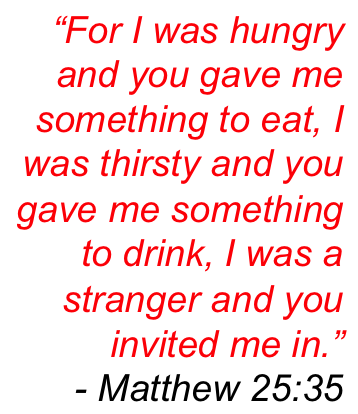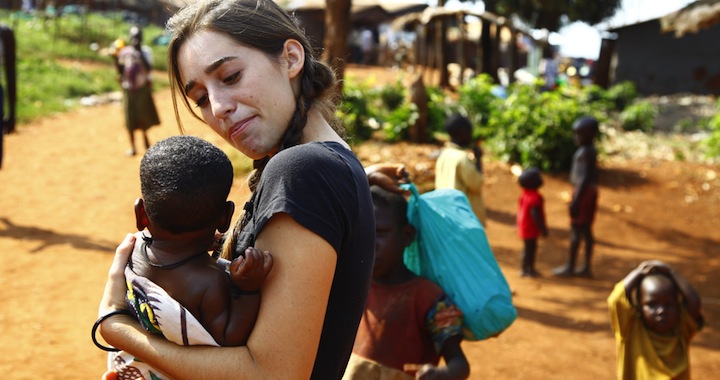Happy National Adoption Month.
Katie Davis, twenty-five, moved from her native Tennessee home several years ago and has adopted over a dozen girls in Uganda, where she’s now raising them. I wanted to know what those of us who aren’t called to follow God in this particular way can learn from Katie. Spoiler alert: a lot.
As both an adoptee and adoptive mama myself, something just seems so right about moving into a child’s world rather than extracting her from it. Who else is doing this today?
The honest answer is that I don’t know of many people who are choosing to adopt by moving into their child’s culture instead of pulling their child out of his or her world, though there are a few, whom I love and admire. I realize that this is the more difficult choice and impossible for many people, and I do believe that there are situations where international adoption is a good option. I, however, am so grateful for the opportunity to raise my children in their own home country and culture. By living here with my children, we also have the great privilege of maintaining relationships with the biological relatives of those of my children who still have living relatives. A few of them are disabled and a few of them struggle with addiction, and we often get to invite them over for a meal, help them with their struggles, and share the Gospel with them!
I believe strongly in a child staying in their culture if at all possible, and maintaining ties with their biological family where appropriate. I believe that for my children, it has given them a strong appreciation of where God has brought them from and all He is doing in their lives. I hope and pray that it also cultivates in them a heart to one day love and serve the people of Uganda. When I was unable to keep each of my girls (6 different sibling sets) with biological family through sponsorship (which I think is absolutely the best option if possible!) I felt that the next best option would be to raise them in their home country as close to their friends, living relatives and usual lifestyle as possible. I don’t know that I viewed this as something requiring courage, or something that just made sense. It has at times seemed like the more difficult choice, but it was certainly the right choice for us and we have been very blessed.
What kind of criticism have you received for adopting your thirteen children?
We have received all kinds of criticism! And while some of it is completely off the wall, I am sure that some of it seems reasonable to whoever is writing/saying it. I am young, I am single, and I do have a lot of children and a lot of responsibility. Criticism is to be expected, I suppose. We get a lot of encouragement from a lot of people as well though. I believe that the Lord has put our family together in a way only He could have, and I am so thankful for what He is doing in and through our family. Ultimately, my desire is to please Him, to follow Him and to glorify Him. While I am happy to answer any questions about our family openly and honestly, and take advice and Godly wisdom anywhere I can, I try not to let the criticism bother me. We have been very blessed in that the positive encouragement we receive is far greater than the occasional negative comments.
I know that the goal of Amazima is to keep children in the care of a parent or other relative. With the recent evangelical emphasis on orphan care through adoption, can you talk about the importance of keeping birth families in tact?
I believe that biological family is God’s first choice for a child. After all, that is the family that He placed them in. Of course, because of sin and brokenness in the world, families often crumble just like everything else, and adoption can be a beautiful, redemptive response to this tragedy. But we must view it as such, a redemptive response to tragedy and brokenness. We are in a dangerous place if adoption ever becomes about us, how we are serving or saving someone else. I very much believe in James’s call to care for the widow and the orphan and Jesus’s call to love our neighbors as ourselves, and I believe we must do this wisely. “Care for” and “love” might mean adoption, but it could also mean many other things. It is my belief that before a child should be adopted every possible effort must be made to keep that child in his biological family, and then in a foster or adoptive situation in their own culture before international adoption is considered.
This is how Amazima started, out of a desire to keep families together as much as possible and keep children from being institutionalized. Of course, as in the case of my girls and so many other children, sometimes there is no biological family, or the biological family is just really not in a place where caring for a child would be an option even with support. In these cases adoption can be a beautiful solution.
I think education is the key here. I don’t think any well meaning, God-seeking family would ever intentionally take a child from his or her biological family if it were not necessary, but unfortunately we do not always have all the facts, especially in the case of international adoption. I would encourage people to ask lots of questions and educate themselves before pursuing adoption of any kind. Jesus is pleased when we love others well, in the compassionate and sacrificial way that He loved us. This can happen in the form of adoption, but in can also happen in many other ways, including that of keeping families together even when it is difficult.
The unique calling on your life is not the call for many Christians. How can these ones participate in caring for the families God loves that are at risk of splitting apart?
I think that if we are to really take the call of the Gospel seriously, we must be involved in caring for the vulnerable in some way or another. Of course, for many people this does not look like moving to a different country or adoption or working for a non-profit. People in need of love are everywhere! They are in our neighborhoods, at our work places, on your street corners.
I think that sponsorship can be a very practical way for people to get involved in helping an at-risk family, even on another continent, from right where they are! Amazima currently has over 600 children who have lost one or both parents, or were at risk of being institutionalized, in our sponsorship program. When sponsored, a child is provided with food, education, medical care, family support and spiritual encouragement. This allows the children in our program to stay with a biological family member or even a Ugandan foster family while still having their needs met. I love watching these children grow and thrive in their own culture and communities because of the generosity of people all over the world who choose to share!
I think folks can be tempted to view you as a glorified nanny. Put some flesh and bones on what it is to mother thirteen children…
I think that anyone who would get a glimpse into our family’s daily life might be surprised to find that my days are just like those of so many mothers of one two or three children, just with more children!
I wake up and drink coffee and spend time with Jesus before my kids wake up, I make breakfast, sign homework books and kiss foreheads before I send the oldest 7 off to school. The younger 6 are still homeschooled and they are in 3 different grades so that makes for a busy morning of spelling corrections and math problems and phonics and lots of fun!
 What the day looks like after lunch largely depends on how much school we got done in the morning! Sometimes we still have work to do and other times we have the opportunity to go serve in one of the many villages Amazima works is. Sometimes we go on a long walk to the river or sometimes we all pile in the van to run to the grocery store.
What the day looks like after lunch largely depends on how much school we got done in the morning! Sometimes we still have work to do and other times we have the opportunity to go serve in one of the many villages Amazima works is. Sometimes we go on a long walk to the river or sometimes we all pile in the van to run to the grocery store.
By around 4 when the big girls get home from school, I have usually already started on dinner. Cooking for this many is time consuming, but I have lots of hands to help. We eat dinner as a family every night and it is often my favorite part of the day. The conversation is lively and I love listening to the girls recount to their sisters what they found fun or interesting throughout the day. If we are being honest, sometimes it is so loud at the dinner table that I can hardly hear, but then I just laugh!
We also study the Bible after breakfast and dinner. Sometimes, we use a devotional book in the morning and other times we just read. At dinner we usually are reading through a book of the Bible and sharing what we’ve learned. I love watching my children grow in their knowledge and love of the Lord! What a great privilege it is to study His Word with them. Bedtime at our house is early, but that helps me stay sane. Then I usually have a couple of quiet hours in the evening to get work done or spend time with Jesus!
When I reread that, it sounds picture perfect doesn’t it? It’s not.
Our days are full of spilled things and sibling squabbles and messes just like every other family’s. Our days are constantly interrupted by people who need help or people who just want to share their hearts. I get frustrated, discouraged and exhausted just like any other mom. Sometimes I look around at all my children and the enormous task of raising another human being seems absolutely impossible. But God is very gracious to us and gives so much joy. I am very thankful.
What words would you share with another twenty-two year-old woman with a bee in her bonnet to imitate what you’ve done?
“Be imitators of God, therefore, as dearly loved children and live a life of love, just as Christ loved us and gave himself up for us as a fragrant offering and sacrifice to God.” Ephesians 5:1.
Sometimes the media can make my life seem glamorous or adventurous. Just the idea of so many children and so much responsibility has the propensity to draw other dreamers to think, “I want to do that.” I can promise that while I love the beautiful life God has given me, there is nothing glamorous or easy about it. Surely there was nothing glamorous or easy about the cross either. I would plead with any person, young or old, woman or man, not to follow my lead but to get down on his or her knees and ask the Father, “What could I do for You today? How could I say, “Yes”? How could I love as Christ loved and give my life up as a fragrant offering for God’s glory?” Dear friends, be imitators of God alone.
Your sponsorship through Amazima keeps families together. Learn more HERE.

